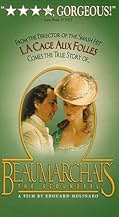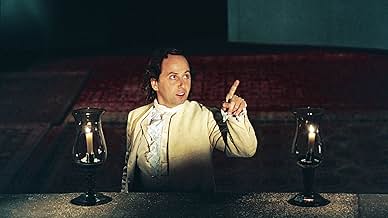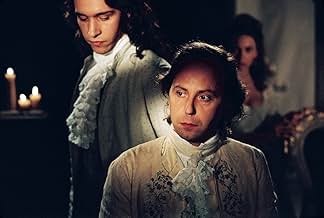It's easy to understand why Guitry would write a play about Beaumarchais, a man of action, a wit and a man of the theatre he would have obviously admired. What is not as clear is how much of his original intention was wasted in this dreary production. The characters are charmless, witless and move in and out much too quickly for any of the cameo players to make any distinct impression.
Worst of all, the actors give in to the worst temptation they could have felt, which is to play in an unconvincing pedantic, precious and yet anachronistic manner, something Guitry would never have allowed in one of his plays. The worst offender is Fabrice Luchini, who doesn't look anything like the original Beaumarchais and has to be most prissy and effeminate heterosexual alive today. His "moues", "oeillades", "plissements de lèvres", egg-sucking and neck-twisting mannerisms succeed in nothing more than a rather good impression of Eric Idle playing an upper-class frump in drag.
The script doesn't spend a single minute pondering the gravity of the title character's situation as the man who wrote the play that arguably brought about the French Revolution. His motivation is never explained apart from the fact that he was left holding the bag of the expenses he incurred helping the American Revolution. In that sense, the film is extremely superficial and potentially libellous.
Its only qualities lie in its original locations (including creaky floors that should have been corrected with a little Foley work), its magnificent score by Jean-Claude Petit (Cyrano de Bergerac, 1990) and its costumes. It is unfortunate that the latter most often end up wearing the players rather than the other way around.
In short, this film is a discredit to both Beaumarchais and Guitry.




































